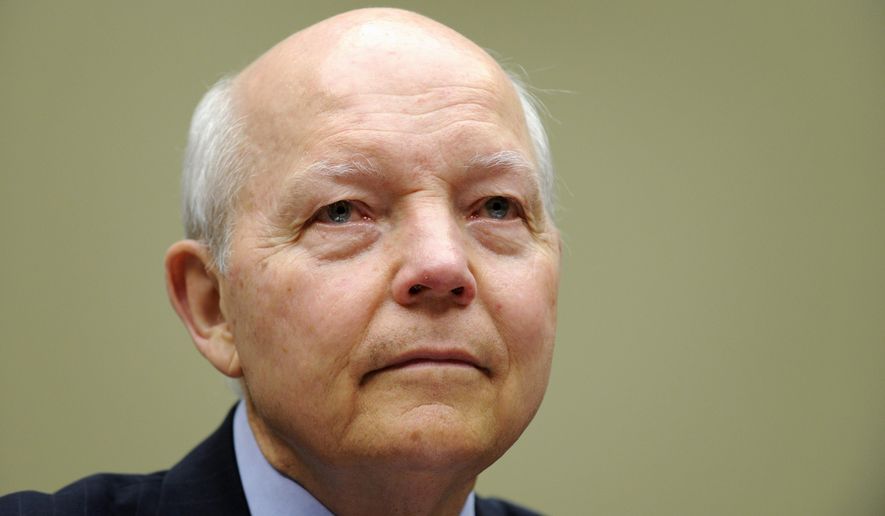The IRS is blaming Obamacare for the agency’s poor customer service, with Commissioner John Koskinen telling Congress on Wednesday that he has had to take money away from answering phone calls and instead spend it on technology and personnel to carry out President Obama’s health care law.
Just 43 percent of taxpayers’ phone calls are being answered so far this year. Mr. Koskinen warned that it would get worse without an infusion of money and Americans may start to feel emboldened to cheat on their taxes.
The IRS chief said Congress didn’t provide additional money to prepare for Obamacare and the tax penalty filings that began this year, so he shuffled at least $100 million from user fee funding that had been going to customer service.
“Because of the zero funding for the Affordable Care Act and [the Foreign Account Tax Compliance Act], the only way we could implement those statutory mandates … in the last year was to move a significant part of that support for taxpayer service into the IT accounts,” Mr. Koskinen said.
Under Obamacare, Americans who don’t have insurance coverage and don’t qualify for an exemption are required to pay a tax penalty to enforce the law’s “individual mandate.”
Last year was the first time the penalty was operational, and most Americans are just now paying their taxes for 2014, meaning the IRS is grappling with the issue for the first time.
Congressional Republicans, trying to kneecap Obamacare, have refused to give the IRS more money to administer the program.
Mr. Koskinen said most of his budget goes to personnel so he has had to cut 3,000 positions from his agency this year, leaving him with 87,000 employees. He said that means fewer people answering calls, and fewer examiners and investigators reviewing filings to make sure Americans are paying their fair share of taxes.
He said Americans might decide it’s easier for them to cheat, lowering the level of tax compliance. Mr. Koskinen said every percentage of lower compliance means $30 billion a year in less revenue to the federal government.
Rep. Ander Crenshaw, Florida Republican and chairman of the House Appropriations subcommittee that writes the IRS budget, said Mr. Koskinen should find better ways to use the money the agency is given before it comes back asking for more.
“Study your budget line by line, prioritize your activities,” he said. “This is your opportunity to show this committee and to show all Americans that it’s no longer business as usual at the IRS.”
Congress has cut IRS funding over the past five years as lawmakers express displeasure with the way the agency has operated.
Mr. Koskinen said he has to manage a careful balance between service and enforcement. He said a drop in either of those could leave the agency collecting less money.
Mr. Crenshaw, though, said the agency isn’t prioritizing its mission correctly.
“We deliberately lowered the IRS funding to a level that will make the IRS think twice about what you are doing and why you are doing it,” he said. “You don’t have a single dime to spare on anything frivolous or foolhardy or even mediocre.”
Mr. Crenshaw said one example was the agency’s decision last year to impose new rules on nonprofit groups even as it was pleading poverty and asking for more money to handle Obamacare and other enforcement priorities.
The IRS later scrapped its proposed rules and vowed to try again.
The agency’s push for new rules grew out of the scandal that ensued with the IRS admission that it improperly targeted tea party groups’ nonprofit applications for intrusive scrutiny.
Nearly two years after the scandal was revealed, Mr. Koskinen acknowledged that nearly a dozen groups have yet to be approved.
One group, the Albuquerque Tea Party, has been waiting since 2009. It has provided hundreds of pages of evidence to the IRS over the years, and officials say they have no idea why they have not been approved.
The groups have applied for status under section 501(c)(4) of the tax code, which designates them as social welfare organizations. Groups under that designation can shield their donors but must abide by rules that prohibit them from making political activities a substantial portion of their work.
Mr. Koskinen’s agency offered groups still awaiting approval a deal that they could get immediate approval if they promised to limit political activity to 40 percent of their budgets.
Conservative lawyers, however, argue that the law and regulations suggest groups should be able to spend 49.9 percent of their money on political activity, so agreeing to the 40 percent level would be ceding some of their rights to the government.
Jay Sekulow, chief council at the American Center for Law and Justice, which represents the Albuquerque Tea Party and at least one other group whose approval is still being blocked by the IRS, said the 40 percent deal wasn’t much of a solution.
“The suggested ’path’ that the IRS commissioner suggests was available a couple of years ago was nothing more than an arbitrary standard that the agency unilaterally constructed out of thin air to placate Americans who have been unlawfully and unconstitutionally targeted by the IRS because of their political beliefs,” Mr. Sekulow said.
He said they will continue to pursue the lawsuit against the IRS.
“The IRS remains an agency incapable of self-governance or self-correction. Our federal lawsuit is moving forward,” Mr. Sekulow said.
In its 2015 IRS funding legislation, Congress included provisions specifically preventing the agency from spending money to target groups for political views, as well as protecting confidentiality of tax returns and halting wasteful spending on conferences.
President Obama removed all of those restrictions from his 2016 budget proposal, further irking Republicans at Wednesday’s hearing.
• Stephen Dinan can be reached at sdinan@washingtontimes.com.




Please read our comment policy before commenting.